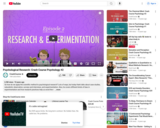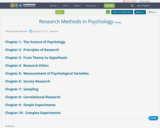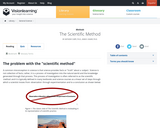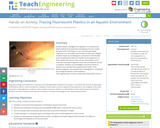
Lab Manual.
- Subject:
- Physical Science
- Material Type:
- Textbook
- Provider:
- Northern Essex Community College
- Author:
- Sarah Courchesne
- Date Added:
- 05/14/2019

Lab Manual.

This is a lesson on methods of Education Psychology

So how do we apply the scientific method to psychological research? Lots of ways, but today Hank talks about case studies, naturalistic observation, surveys and interviews, and experimentation. Also, he covers different kinds of bias in experimentation and how research practices help us avoid them.
Chapters:
Introduction: Intuition & Hindsight Bias
The Scientific Method
Case Studies
Naturalistic Observation
Surveys and Interviews
Drawing Conclusions
Experimentation
Experiment Time!
Review

The course is an introduction to the approach of Reflective Practice developed by Donald Schön. It is an approach that enables professionals to understand how they use their knowledge in practical situations and how they can combine practice and learning in a more effective way. Through greater awareness of how they deploy their knowledge in practical situations, professionals can increase their capacities of learning in a more timely way. Understanding how they frame situations and ideas helps professionals to achieve greater flexibility and increase their capacity of conceptual innovation.
The objective of the course is to introduce students to the approach and methods of reflective practice by raising their awareness about their own cognitive resources and how they use them in their practice. The course will introduce theories of learning, knowledge generation, framing and reframing, theories of action, reflection-in-practice, and conceptual innovation, and provide students with opportunities to experiment with these theories in real life through practical exercises in which they reflect on real situations that they have faced in their past professional experience. Through these practical exercises, students will have the opportunity to reflect on their thinking capacities in the context of their practice.

Research Methods in Psychology is intended to provide a fundamental understanding of the basics of experimental research in the psychological sciences.
Research Methods in Psychology adapted by Michael G. Dudley is licensed under Creative Commons Attribution-NonCommercial-ShareAlike 4.0 license.
Research Methods in Psychology is adapted from a work produced and distributed under a Creative Commons license (CC BY-NC-SA) in 2010 by a publisher who has requested that they and the original author not receive attribution. This adapted edition is based on an adaptation produced by the University of Minnesota Libraries Publishing through the eLearning Support Initiative. This adapted edition was created by Michael G. Dudley with support from the Palomar College Foundation.
This adaptation has significantly altered the original 2010 text and removed images. This work is made available under the terms of a Creative Commons Attribution-NonCommercial-ShareAlike license.

With this plan, our aim is the importance of 5 elements in our lives for children. The soil element is applied gradually according to the stem activities to increase the level of awareness of children.

This lesson is an introduction to the scientific method of observation, hypothesis formation and experimentation.

Student teams investigate the migration of small-particle plastic pollution by exposing invertebrates found in water samples from a local lake or river to fluorescent bead fragments in a controlled environment of their own designs. Students begin by reviewing the composition of food webs and considering the ethics of studies on live organisms. In their model microcosms, they set up a food web so as to trace the microbead migration from one invertebrate species to another. Students use blacklights and microscopes to observe and quantify their experimental results. They develop diagrams that explain their investigations—modeling the ecological impacts of microplastics.

The basic objective of Unified Engineering is to give a solid understanding of the fundamental disciplines of aerospace engineering, as well as their interrelationships and applications. These disciplines are Materials and Structures (M); Computers and Programming (C); Fluid Mechanics (F); Thermodynamics (T); Propulsion (P); and Signals and Systems (S). In choosing to teach these subjects in a unified manner, the instructors seek to explain the common intellectual threads in these disciplines, as well as their combined application to solve engineering Systems Problems (SP). Throughout the year, the instructors emphasize the connections among the disciplines.